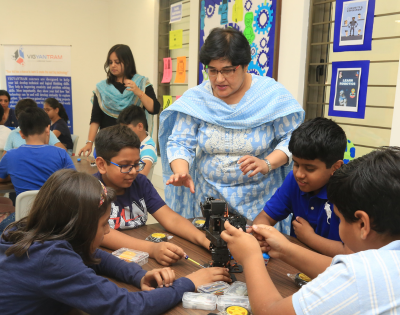In a world where academic achievements and intellectual prowess often take center stage, it is easy to overlook the equally crucial aspect of a child’s development: Emotional Intelligence. By fostering emotional intelligence from an early age, we encourage young minds to build healthier relationships, make better decisions, and embrace life’s challenges with resilience.
It plays a crucial role in shaping a child’s social interactions, academic performance, and overall well-being. As parents, educators, and caregivers, it is our responsibility to equip children with the tools necessary to navigate their emotions effectively. In this blog, we will explore the top strategies to cultivate emotional intelligence in children.
- Creating a Nurturing Environment
The foundation of fostering emotional intelligence begins with creating a nurturing environment that values emotions and encourages open communication. Children should feel safe and supported to express their feelings without fear of judgment or reprimand. Providing a secure space enables them to develop self-awareness and explore their emotions freely.

- Emotional Literacy
Emotional literacy is the ability to recognize and label emotions accurately. Encouraging children to identify and name their feelings helps them develop a vocabulary to express themselves.
Through discussions, storytelling, and role-playing, we can teach children to differentiate between emotions like happiness, sadness, anger, and fear. By understanding their emotions, children gain the capacity to manage them constructively.
- Active Listening and Empathy
Practicing active listening and empathy nurtures emotional intelligence by teaching children to understand others’ perspectives and experiences. When children feel heard and understood, they develop a stronger sense of empathy towards others. Engage in conversations where you genuinely listen to their thoughts and feelings, fostering connection and emotional growth. Encourage them to step into others’ shoes, promoting empathy as a natural response.

- Emotional Regulation
Helping children learn how to regulate their emotions is vital for their well-being and relationships. Teach them simple techniques such as deep breathing, counting to ten, or taking a break to calm down when feeling overwhelmed. By modeling self-control and providing coping strategies, we equip children to handle challenging situations with calm & composure.
- Conflict Resolution and Problem-Solving
Conflict is an inevitable part of life, and guiding children through constructive conflict resolution builds their emotional intelligence. Teach them to identify the source of the conflict, express their emotions assertively, and work towards finding mutually beneficial solutions. Encourage brainstorming, compromise, and negotiation to help children develop problem-solving skills while making healthy relationships.
- Cultivating Emotional Awareness through Art and Literature
Art and literature provide powerful avenues for exploring emotions and developing emotional intelligence in children. Encourage them to engage with various art forms, such as drawing, painting, or writing, as a means of self-expression. Introduce books that tackle complex emotions and moral dilemmas, allowing children to empathize with characters and relate them to their own experiences.

- Mindfulness and Emotional Intelligence
Practicing mindfulness encourages self-awareness, attention, and emotional regulation in children. Teach them simple mindfulness exercises like focused breathing or body scans, helping them stay present in the moment. Mindfulness enhances their ability to recognize and understand their emotions and helps control hyperactivity in children.
- Encouraging Emotional Risk-Taking
Encouraging children to step out of their comfort zones and take emotional risks promotes emotional intelligence. Encourage them to try new activities, make new friends, and express themselves creatively.
Celebrate their efforts (not just the wins) to instill a growth mindset even if they face setbacks. Teach them that mistakes and failures are opportunities for learning and growth.
Cultivating emotional intelligence in children is a lifelong investment that reaps immeasurable rewards. By nurturing their emotional well-being, we empower them to navigate the complexities of life with resilience, empathy, and self-awareness.
Through creating a nurturing environment, teaching emotional literacy, promoting empathy and active listening, facilitating emotional regulation, and providing opportunities for problem-solving and emotional risk-taking, we equip children with essential skills that will serve them well into adulthood.




